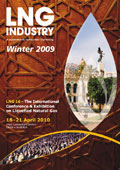Editorial comment
The world is now cautiously eyeing the Arctic, anxiously noting incremental degrees of thaws and freezes, and deducing what this might mean for future energy production in both positive and negative terms. The shocking claim that the Arctic sea will be completely ice-free during the summer within 20 years illustrates just how indeterminate the environment that we live in continues to be. On one hand, an ice-free summer would spell easier oil and gas exploration in the region. The Northwest Passage could become a watery bridge for commercial enterprises, potentially allowing us to tap into vast swathes of previously inaccessible resources, and turning back the clock on our inexorable global fossil fuel decline. The downside to the loss of the world’s most fragile region is a medley of catastrophic predictions that no one really wants to accept as possible.
Register for free »
Get started now for absolutely FREE, no credit card required.
And it’s not just the natural environment that holds uncertainty for us in the near future. The global political climate can be just as ambiguous. With Asian LNG traditionally linked to oil prices, and US LNG prices determined by the gas market, global LNG pricing has been predicted to come closer in the future. The gap in pricing will be bridged by countries like Qatar, which continues to be pivotal in driving LNG exports around the world. Opportunities will continue to expand for LNG – strong in its advantage of being shippable to anywhere in the world, and a comparatively carbon-friendly energy source.
Natural gas has been tipped as the ‘bridge fuel’ to a more environmentally stable future. In his speech at the World Gas Conference in Buenos Aires in October, BP’s Tony Hayward said, ‘I don’t think we can afford to wait. We need to take carbon out of the energy mix today. […] I can see only one way of doing it – by increasing the use of natural gas.’ But as the Arctic polar bears finally steady themselves on the thick ice in their ever-limited cold December days, the most imminent bridge for us to cross this month towards a more stable future will be the United Nations Climate Change Conference in Copenhagen.
Anna Scordos - Editor

